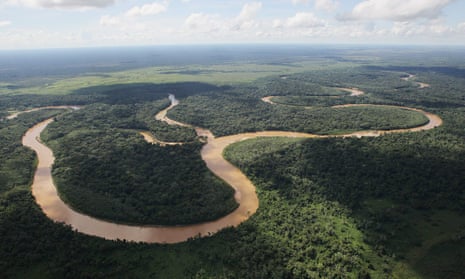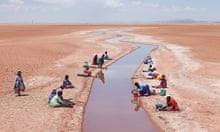When Ovidio Teco’s Amazon homeland was declared “untouchable” by the Bolivian government in 2011, his war had been won.
The concerns of people like him had been listened to: their beautiful and ancient land would not be carved in two by a 190-mile highway.
That year, a demonstration half a decade in the making saw thousands of indigenous people march for nearly two months to the Bolivian capital, La Paz, protesting over the route that would have cut through the heart of the park.
The marchers endured teargas and truncheons at the hands of the authorities, but they persevered, won an audience with President Evo Morales and forced the government’s hand. The road was shelved and the Isiboro Sécure Indigenous Territory and National Park (Tipnis) was granted a new special status, rendering it off limits to such major and invasive building projects.
But six years later, the Bolivian government has backtracked. A bill rushed through congress, culminating in the stroke of a pen by Morales on Sunday 13 August, nullifies the park’s status as untouchable, paving the way for the road to be built after all.
Teco is seated at the head of his kitchen table. His voice trembles as he gesticulates fervently. “They lied, nothing more. After the march we thought the park would not be touched. This situation is all lies.”
Teco is a small-time farmer of cacao, the base product of chocolate, in the Mojeño community of Gundonovia, a remote settlement of about 40 families in the north-east of the park. It sits metres from the silently flowing Isiboro river, the peace punctuated only by the puff of pink river dolphins surfacing to breathe. Alligators line the banks, motionless, mouths agape, as they take in the sun.
Spanning an area of 1.2m hectares, Tipnis is home to close to 14,000 inhabitants, mainly indigenous people of the Mojeño-Trinitario, Yuracaré and Tsimané groups. Like Teco, many fear building a road through the park will destroy its biodiversity. A 2011 study by the Programme for Strategic Investigation in Bolivia forecast 64% deforestation of the park within 18 years if the road is built.
“It’s not the road itself. It’s what comes with it. Coca producers will go and settle down and get new land inside the park. And after that comes, they take the wood, plant coca leaves, etc. And where the road will run is the richest part,” says Pablo Solón, a former ambassador to the UN, who resigned from the Morales administration in 2011 over the Tipnis dispute.
The park’s heartland, where the planned road will run, is sacred to many indigenous groups and is where the animals take refuge during the rainy season, and where many indigenous people go to hunt them.
“The day the government rips up the land, this is all going to disappear. Who is going to suffer? It will be us who live in Tipnis. The animals will die. And so will we,” says Teco.
The government claims that removing the lands’ untouchable status is necessary to provide basic services to the local communities and construct educational and healthcare facilities. It also repeatedly cites a 2012 consultation that indicated the move was backed by locals.
“It was their decision. They want to improve their living conditions. They want a road,” says Susana Rivero Guzmán, a deputy in Bolivia’s ruling Movimiento al Socialismo (Mas) party, noting the consultation found 58 of 68 communities in Tipnis backed removing untouchability.
But locals claim the survey was rigged. They say that only carefully selected people in the various communities were consulted, and those who took part were granted perks.
“They gave the people cellphones, they gave them cookers, they gave them televisions, they gave them grants, they gave them motors. So that in the end, they saw that they wanted the road. Everything was shady,” says Teco.
A joint assessment by the International Federation of Human Rights, the Bolivian Permanent Assembly of Human Rights and the Catholic church in 2016 concluded that the consultation had been “neither free nor informed and did not respect the principle of good faith”.
Some residents could stomach a road through the park, if it gave them greater access to the outside world, but the proposed route, connecting Villa Tunari and San Ignacio de Moxos runs through the centre of the park, far away from the communities, which are concentrated along its eastern flank.
“If there were some benefits, I would support it. But there is not one benefit for us,” says Carmen Leni, a schoolteacher in Gundonovia, swatting mosquitoes from her legs with a tea towel.
“If it allowed people to send and bring goods, it would be OK, but this will not be the result. The road will not come through here.”
Adolfo Moye, a former community leader, agreed. “Absolutely – I would be in favour of a road that served the communities. These people are isolated. They need access to outside. But the planned road serves not a single person here.”
Locals believe the real purpose of the road is to benefit the cocaleros – coca growers – who have colonised the park’s southern “Polygon Seven” region, allowing them to push northward.

Farmers of the coca leaf – consumed for centuries by Andean communities for its medicinal and religious properties, and also the basis of cocaine – are a key support base for the incumbent Mas government. President Morales was once a cocalero himself.
The conflict in large part boils down to the diametrically opposed viewpoints of different groups, according to Carwil Bjork-James, an anthropologist at Vanderbilt University in Tennessee. “My general take is that the side-by-side communities of coca growers and Yuracaré, Mojeño and Tsiminé community residents have worldviews that are poles apart, at least when it comes to plans for land and territory,” he says.
“For the cocaleros everything has revolved around finding a viable cash crop and converting a little piece of forest into the plot where you can earn an income … But for the residents deeper in the forest … their religious vision of a sacred hill or holy land is about a place without property lines where they can get their necessities from the land and rivers.”
Solón fears this could be a watershed moment. He says the move is a show of strength by the government, keen to lay down a marker that it will not be dictated to by indigenous communities.
“From my point of view the Tipnis situation is much bigger than a road. It’s a kind of model of development that the government wants to put in place. It’s like when you hit the table and you say, ‘Look, we’re going to do it – yes or yes,’” he says.
For Teco it is part of a wider standoff between those who want to protect the environment and external interests that would seek to harm it. “The environment gives us life,” he says. “The day that they raise the block on this zone, it collapses. We already feel climate change. Worldwide, human beings are going to suffer.
“We’re going to continue fighting to the end,” he adds. “So long as we have life, we will continue fighting.”











Comments (…)
Sign in or create your Guardian account to join the discussion